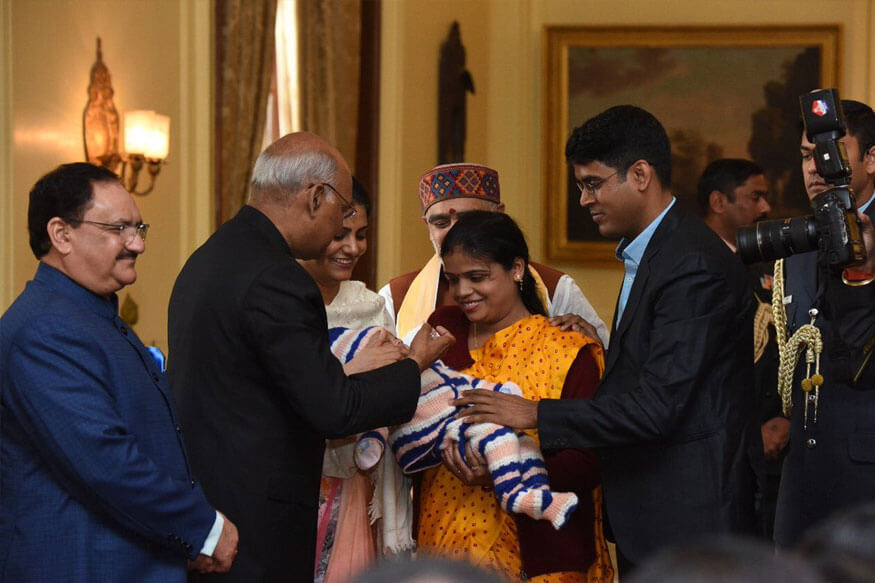In the wake of the National Immunisation Day, the Government has launched the Pulse Polio Immunisation Programme today- that looks to cover more than 17 crore children under the age of five years.
The initiative was kickstarted by the President of India, Shri Ram Nath Kovind in Rashtrapati Bhavan today. JP Nadda, Union Minister of Health, made an announcement on Twitter today requesting parents to make sure they didn’t miss out on their child’s essential vaccinations.
Union #Health Minister Shri @JPNadda – I urge all parents to ensure that their children are protected with #Polio Vaccine, available free of cost at #Polio booths across the country on 28th Jan, the National #Immunisation Day. #SwasthaBharat#HealthForAll #vaccineswork pic.twitter.com/9Qgcz2DF6X
— Ministry of Health (@MoHFW_INDIA) January 26, 2018
Basics of Pulse Polio Immunisation:
- Polio is a spreading disease, which causes permanent disability in a child. It is caused by a virus which spreads through contaminated food and water. It grows in human intestine and is excreted through stools. If a child is infected with poliovirus, it causes fever for a couple of days and involves the nerve cells in the brain and spinal chord leading to paralysis and the child is permanently crippled.
- Prevention is very simple, by giving potent polio vaccine to the child in full doses at appropriate age the child can be protected against Polio.
- Pulse Polio Immunization (PPI) refers to the Simultaneous administration of two doses of polio vaccines to all the children below five years of age irrespective of their vaccination status.
- Immunisation is a must because few children may harbour wild poliovirus in their intestine in spite of complete immunization. Such children may not suffer from polio but are likely to spread the infection to other susceptible children.
- Extra doses of oral polio vaccine during PPI will ensure that wild virus from their intestine will be replaced by vaccine virus, thus interrupting the chain of transmission of the wild virus and ultimately leading to total eradication of polio.
- Routine vaccination must be continued without fail even if pulse polio days fall on the next day of the routine immunization days. This does not interfere with regular polio vaccination but provides an additional protection against the disease.
- All children, even those with minor ailments like cold, cough, vomiting, loose stools etc. can be given polio vaccine unless the child is very sick and hospitalized.
Also read: The essential immunisation chart for children
Polio Vaccine- a natural commitment
All children, even those with minor ailments like cold, cough, vomiting, loose stools etc. can be given polio vaccine unless the child is very sick and hospitalized, says Consultant Paediatrician, Dr. Rajam Natarajan.
Polio is a spreading disease, which causes permanent disability in a child. It is caused by a virus which spreads through contaminated food and water. It grows in human intestine and is excreted through stools. If a child is infected with poliovirus, it causes fever for a couple of days and involves the nerve cells in the brain and spinal chord leading to paralysis and the child is permanently crippled.Prevention is very simple, by giving potent polio vaccine to the child in full doses at the appropriate age your child can be protected against Polio.
Pulse Polio Immunization (PPI) refers to the Simultaneous administration of two doses of polio vaccines to all the children below five years of age irrespective of their vaccination status.
Immunisation is a must because few children may harbor wild poliovirus in their intestine in spite of complete immunization. Such children may not suffer from polio but are likely to spread the infection to other susceptible children. Extra doses of oral polio vaccine during PPI will ensure that wild virus from their intestine will be replaced by vaccine virus, thus interrupting the chain of transmission of the wild virus and ultimately leading to total eradication of polio.
Routine vaccination must be continued without fail even if pulse polio days fall on the next day of the routine immunization days. This does not interfere with regular polio vaccination but provides an additional protection against the disease.
Keep the children around you protected from disabilities. Let us all pledge to maintain the victory over #Polio with #TwoDropsOfLife. #NationalImmunizationDays to be observed on 28th Jan & 11th Mar 2018. #StayPolioFree #SwasthaBharat @JPNadda @AnupriyaSPatel @AshwiniKChoubey pic.twitter.com/rVnqGodXkm
— Ministry of Health (@MoHFW_INDIA) January 28, 2018
Also read: The essential chicken pox vaccine for kids
